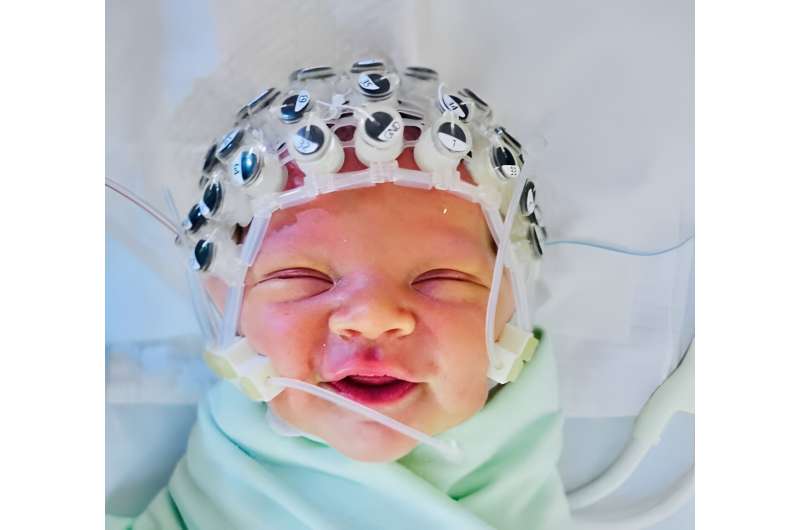This article has been reviewed according to Science X's editorial process and policies. Editors have highlighted the following attributes while ensuring the content's credibility:
fact-checked
peer-reviewed publication
trusted source
proofread
Newborn babies can perceive the beat in music, study shows

Newborn babies can perceive the beat in music, new research has confirmed. The study, carried out by a team of scientists from the University of Amsterdam and the HUN-REN Research Center for Natural Sciences (TTK) in Hungary, shows that this ability to recognize a beat is not simply due to the statistical learning ability of newborns, but that beat perception is actually a separate cognitive mechanism that is already active at birth. The study was published on 27 November in the journal Cognition.
"There is still a lot we don't know about how newborn babies perceive, remember and process music," says author Henkjan Honing, professor of Music Cognition at the UvA. "But, in 2009, we found clear indications that babies of just a few days old have the ability to hear a regular pulse in music—the beat—a characteristic that is considered essential for making and appreciating music."
Because the previous research from Honing and his colleagues had so far remained unreplicated and they still had many questions, the UvA and TTK joined forces once again—this time using a new paradigm. In an experiment with 27 newborn babies, researchers manipulated the timing of drum rhythms to see whether babies make a distinction between learning the order of sounds in a drum rhythm (statistical learning) and being able to recognize a beat (beat-induction).
Manipulated timing
The babies were presented with two versions of one drum rhythm through headphones. In the first version, the timing was isochronous: the distance between the sounds was always the same. This allows you to hear a pulse or beat in the rhythm. In the other version, the same drum pattern was presented, but with random timing (jittered). As a result, beat perception was not possible, but the sequence of sounds could be learned. This allowed the researchers to distinguish between beat perception and statistical learning.
Because behavioral responses in newborn babies cannot be observed, the research was done with brain wave measurements (EEG) while the babies were sleeping. This way, the researchers were able to view the brain responses of the babies. These responses showed that the babies heard the beat when the time interval between the beats was always the same. But when the researchers played the same pattern at irregular time intervals, the babies didn't hear a beat.
Not a trivial skill
"This crucial difference confirms that being able to hear the beat is innate and not simply the result of learned sound sequences," said co-author István Winkler, professor at the Institute of Cognitive Neuroscience and Psychology at TTK.
"Our findings suggest that it is a specific skill of newborns and make clear how important baby and nursery rhymes are for the auditory development of young children. More insight into early perception is of great importance for learning more about infant cognition and the role that musical skills may play in early development."
Honing adds, "Most people can easily pick up the beat in music and judge whether the music is getting faster or slower—it seems like an inconsequential skill. However, since perceiving regularity in music is what allows us to dance and make music together, it is not a trivial phenomenon. In fact, beat perception can be considered a fundamental human trait that must have played a crucial role in the evolution of our capacity for music."
More information: Gábor P. Háden et al, Beat processing in newborn infants cannot be explained by statistical learning based on transition probabilities, Cognition (2023). DOI: 10.1016/j.cognition.2023.105670



















